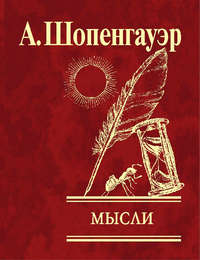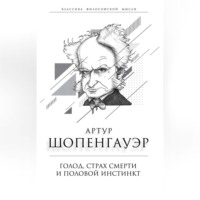 полная версия
полная версияThe World as Will and Idea (Vol. 3 of 3)
I have further to add here a special remark on the childlike character of the genius, i. e., on a certain resemblance which exists between genius and the age of childhood. In childhood, as in the case of genius, the cerebral and nervous system decidedly preponderates, for its development hurries far in advance of that of the rest of the organism; so that already at the seventh year the brain has attained its full extension and mass. Therefore, Bichat says: “Dans l'enfance le système nerveux, comparé au musculaire, est proportionellement plus considérable que dans tous les âges suivans, tandis que par la suite, la pluspart des autres systèmes prédominent sur celui-ci. On sait que, pour bien voir les nerfs, on choisit toujours les enfans” (De la vie et de la mort, art. 8, § 6). On the other hand, the development of the genital system begins latest, and irritability, reproduction, and genital function are in full force only at the age of manhood, and then, as a rule, they predominate over the brain function. Hence it is explicable that children, in general, are so sensible, reasonable, desirous of information, and teachable, nay, on the whole, are more disposed and fitted for all theoretical occupation than grown-up people. They have, in consequence of that course of development, more intellect than will, i. e., than inclinations, desire, and passion. For intellect and brain are one, and so also is the genital system one with the most vehement of all desires: therefore I have called the latter the focus of the will. Just because the fearful activity of this system still slumbers, while that of the brain has already full play, childhood is the time of innocence and happiness, the paradise of life, the lost Eden on which we look longingly back through the whole remaining course of our life. But the basis of that happiness is that in childhood our whole existence lies much more in knowing than in willing – a condition which is also supported from without by the novelty of all objects. Hence in the morning sunshine of life the world lies before us so fresh, so magically gleaming, so attractive. The small desires, the weak inclinations, and trifling cares of childhood are only a weak counterpoise to that predominance of intellectual activity. The innocent and clear glance of children, at which we revive ourselves, and which sometimes in particular cases reaches the sublime contemplative expression with which Raphael has glorified his cherubs, is to be explained from what has been said. Accordingly the mental powers develop much earlier than the needs they are destined to serve; and here, as everywhere, nature proceeds very designedly. For in this time of predominating intelligence the man collects a great store of knowledge for future wants which at the time are foreign to him. Therefore his intellect, now unceasingly active, eagerly apprehends all phenomena, broods over them and stores them up carefully for the coming time, – like the bees, who gather a great deal more honey than they can consume, in anticipation of future need. Certainly what a man acquires of insight and knowledge up to the age of puberty is, taken as a whole, more than all that he afterwards learns, however learned he may become; for it is the foundation of all human knowledge. Up till the same time plasticity predominates in the child's body, and later, by a metastasis, its forces throw themselves into the system of generation; and thus with puberty the sexual passion appears, and now, little by little, the will gains the upper hand. Then childhood, which is prevailingly theoretical and desirous of learning, is followed by the restless, now stormy, now melancholy, period of youth, which afterwards passes into the vigorous and earnest age of manhood. Just because that impulse pregnant with evil is wanting in the child is its volition so adapted and subordinated to knowledge, whence arises that character of innocence, intelligence, and reasonableness which is peculiar to the age of childhood. On what, then, the likeness between childhood and genius depends I scarcely need to express further: upon the surplus of the powers of knowledge over the needs of the will, and the predominance of the purely intellectual activity which springs from this. Really every child is to a certain extent a genius, and the genius is to a certain extent a child. The relationship of the two shows itself primarily in the naïveté and sublime simplicity which is characteristic of true genius; and besides this it appears in several traits, so that a certain childishness certainly belongs to the character of the genius. In Riemer's “Mittheilungen über Goethe” (vol. i. p. 184) it is related that Herder and others found fault with Goethe, saying he was always a big child. Certainly they were right in what they said, but they were not right in finding fault with it. It has also been said of Mozart that all his life he remained a child (Nissen's Biography of Mozart, p. 2 and 529). Schlichtegroll's “Nekrology” (for 1791, vol. ii. p. 109) says of him: “In his art he early became a man, but in all other relations he always remained a child.” Every genius is even for this reason a big child; he looks out into the world as into something strange, a play, and therefore with purely objective interest. Accordingly he has just as little as the child that dull gravity of ordinary men, who, since they are capable only of subjective interests, always see in things mere motives for their action. Whoever does not to a certain extent remain all his life a big child, but becomes a grave, sober, thoroughly composed, and reasonable man, may be a very useful and capable citizen of this world; but never a genius. In fact, the genius is so because that predominance of the sensible system and of intellectual activity which is natural to childhood maintains itself in him in an abnormal manner through his whole life, thus here becomes perennial. A trace of this certainly shows itself in many ordinary men up to the period of their youth; therefore, for example, in many students a purely intellectual tendency and an eccentricity suggestive of genius is unmistakable. But nature returns to her track; they assume the chrysalis form and reappear at the age of manhood, as incarnate Philistines, at whom we are startled when we meet them again in later years. Upon all this that has been expounded here depends Goethe's beautiful remark: “Children do not perform what they promise; young people very seldom; and if they do keep their word, the world does not keep its word with them” (Wahlverwandtschaften, Pt. i. ch. 10) – the world which afterwards bestows the crowns which it holds aloft for merit on those who are the tools of its low aims or know how to deceive it. In accordance with what has been said, as there is a mere beauty of youth, which almost every one at some time possesses (beauté du diable), so there is a mere intellectuality of youth, a certain mental nature disposed and adapted for apprehending, understanding, and learning, which every one has in childhood, and some have still in youth, but which is afterwards lost, just like that beauty. Only in the case of a very few, the chosen, the one, like the other, lasts through the whole life; so that even in old age a trace of it still remains visible: these are the truly beautiful and the men of true genius.
The predominance of the cerebral nervous system and of intelligence in childhood, which is here under consideration, together with the decline of it in riper age, receives important illustration and confirmation from the fact that in the species of animals which stands nearest to man, the apes, the same relation is found in a striking degree. It has by degrees become certain that the highly intelligent orang-outang is a young pongo, which when it has grown up loses the remarkable human look of its countenance, and also its astonishing intelligence, because the lower and brutal part of its face increases in size, the forehead thereby recedes, large cristæ, muscular developments, give the skull a brutish form, the activity of the nervous system sinks, and in its place extraordinary muscular strength develops, which, as it is sufficient for its preservation, makes the great intelligence now superfluous. Especially important is what Fréd. Cuvier has said in this reference, and Flourens has illustrated in a review of the “Histoire Naturelle” of the former, which appeared in the September number of the “Journal des Savans” of 1839, and was also separately printed with some additions, under the title, “Résumé analytique des observations de Fr. Cuvier sur l'instinct et l'intelligence des animaux,” p. Flourens, 1841. It is there said, p. 50: “L'intelligence de l'orang-outang, cette intelligence si développée, et développée de si bonne heure, décroit avec l'âge. L'orang-outang, lorsqu'il est jeune, nous étonne par sa pénétration, par sa ruse, par son adresse; l'orang-outang, devenu adulte, n'est plus qu'un animal grossier, brutal, intraitable. Et il en est de tous les singes comme de l'orang-outang. Dans tous, l'intelligence décroit à mesure que les forces s'accroissent. L'animal qui a le plus d'intelligence, n'a toute cette intelligence que dans le jeune âge.” Further, p. 87: “Les singes de tous les genres offrent ce rapport inverse de l'âge et de l'intelligence. Ainsi, par exemple, l'Entelle (espèce de guenon du sous-genre des Semno-pithèques et l'un des singes vénérés dans la religion des Brames) a, dans le jeune âge, le front large, le museau peu saillant, le crâne élevé, arrondi, etc. Avec l'âge le front disparait, recule, le museau proémine; et le moral ne change pas moins que le physique: l'apathie, la violence, le besoin de solitude, remplacent la pénétration, la docilité, la confiance. ‹ Ces différences sont si grandes, › dit Mr. Fréd. Cuvier, ‹ que dans l'habitude où nous sommes de juger des actions des animaux par les nôtres, nous prendrions le jeune animal pour un individu de l'âge, où toutes les qualités morales de l'espèce sont acquises, et l'Entelle adulte pour un individu qui n'aurait encore que ses forces physiques. Mais la nature n'en agit pas ainsi avec ces animaux, qui ne doivent pas sortir de la sphère étroite, qui leur est fixée, et à qui il suffit en quelque sorte de pouvoir veiller à leur conservation. Pour cela l'intelligence était nécessaire, quand la force n'existait pas, et quand celle-ci est acquise, toute autre puissance perd de son utilité. ›” And p. 118: “La conservation des espèces ne repose pas moins sur les qualités intellectuelles des animaux, que sur leurs qualités organiques.” This last confirms my principle that the intellect, like the claws and teeth, is nothing else than a weapon in the service of the will.
Chapter XXXII.14 On Madness
The health of the mind properly consists in perfect recollection. Of course this is not to be understood as meaning that our memory preserves everything. For the past course of our life shrinks up in time, as the path of the wanderer looking back shrinks up in space: sometimes it is difficult for us to distinguish the particular years; the days have for the most part become unrecognisable. Really, however, only the exactly similar events, recurring an innumerable number of times, so that their images, as it were, conceal each other, ought so to run together in the memory that they are individually unrecognisable; on the other hand, every event in any way peculiar or significant we must be able to find again in memory, if the intellect is normal, vigorous, and quite healthy. In the text I have explained madness as the broken thread of this memory, which still runs on regularly, although in constantly decreasing fulness and distinctness. The following considerations may serve to confirm this.
The memory of a healthy man affords a certainty as to an event he has witnessed, which is regarded as just as firm and sure as his present apprehension of things; therefore, if sworn to by him, this event is thereby established in a court of law. On the other hand, the mere suspicion of madness will at once weaken the testimony of a witness. Here, then, lies the criterion between the healthy mind and insanity. Whenever I doubt whether an event which I remember really took place, I throw upon myself the suspicion of madness: unless it is that I am uncertain whether it was not a mere dream. If another doubts the reality of an event, related by me as an eye-witness, without mistrusting my honesty, then he regards me as insane. Whoever comes at last, through constantly recounting an event which originally was fabricated by him, to believe in it himself is, in this one point, really insane. We may ascribe to an insane person flashes of wit, single clever thoughts, even correct judgments, but his testimony as to past events no man will consider valid. In the Lalita-vistara, well known to be the history of Buddha Sakya-Muni, it is related that at the moment of his birth all the sick became well, all the blind saw, all the deaf heard, and all mad people “recovered their memory.” This last is mentioned in two passages.15
My own experience of many years has led me to the opinion that madness occurs proportionally most frequently among actors. But what a misuse they make of their memory! Daily they have to learn a new part or refresh an old one; but these parts are entirely without connection, nay, are in contradiction and contrast with each other, and every evening the actor strives to forget himself entirely and be some quite different person. This kind of thing paves the way for madness.
The exposition of the origin of madness given in the text will become more comprehensible if it is remembered how unwillingly we think of things which powerfully injure our interests, wound our pride, or interfere with our wishes; with what difficulty do we determine to lay such things before our own intellect for careful and serious investigation; how easily, on the other hand, we unconsciously break away or sneak off from them again; how, on the contrary, agreeable events come into our minds of their own accord, and, if driven away, constantly creep in again, so that we dwell on them for hours together. In that resistance of the will to allowing what is contrary to it to come under the examination of the intellect lies the place at which madness can break in upon the mind. Each new adverse event must be assimilated by the intellect, i. e., it must receive a place in the system of the truths connected with our will and its interests, whatever it may have to displace that is more satisfactory. Whenever this has taken place, it already pains us much less; but this operation itself is often very painful, and also, in general, only takes place slowly and with resistance. However, the health of the mind can only continue so long as this is in each case properly carried out. If, on the contrary, in some particular case, the resistance and struggles of the will against the apprehension of some knowledge reaches such a degree that that operation is not performed in its integrity, then certain events or circumstances become for the intellect completely suppressed, because the will cannot endure the sight of them, and then, for the sake of the necessary connection, the gaps that thus arise are filled up at pleasure; thus madness appears. For the intellect has given up its nature to please the will: the man now imagines what does not exist. Yet the madness which has thus arisen is now the lethe of unendurable suffering; it was the last remedy of harassed nature, i. e., of the will.
Let me mention here in passing a proof of my view which is worth noticing. Carlo Gozzi, in the “Monstro turchino,” act i. scene 2, presents to us a person who has drunk a magic potion which produces forgetfulness, and this person appears exactly like a madman.
In accordance with the above exposition one may thus regard the origin of madness as a violent “casting out of the mind” of anything, which, however, is only possible by “taking into the head” something else. The converse process is more rare, that the “taking into the head” comes first, and the “casting out of the mind” second. It takes place, however, in those cases in which the occasion of insanity is kept constantly present to the mind and cannot be escaped from; thus, for example, in the case of many who have gone mad from love, erotomaniacs, where the occasion of their madness is constantly longed after; also in the case of madness which has resulted from the fright of some sudden horrible occurrence. Such patients cling, as it were, convulsively to the thought they have grasped, so that no other, or at least none opposed to it, can arise. In both processes, however, what is essential to madness remains the same, the impossibility of a uniformly connected recollection, such as is the basis of our healthy and rational reflection. Perhaps the contrast of the ways in which they arise, set forth here, might, if applied with judgment, afford a sharp and profound principle of division of delusions proper.
For the rest, I have only considered the physical origin of madness, thus what is introduced by external, objective occasions. More frequently, however, it depends upon purely physical causes, upon malformations or partial disorganisation of the brain or its membranes, also upon the influence which other parts affected with disease exercise upon the brain. Principally in the latter kind of madness false sense-perceptions, hallucinations, may arise. Yet the two causes of madness will generally partake of each other, particularly the psychical of the physical. It is the same as with suicide, which is rarely brought about by an external occasion alone, but a certain physical discomfort lies at its foundation; and according to the degree which this attains to a greater or less external occasion is required; only in the case of the very highest degree is no external occasion at all required. Therefore there is no misfortune so great that it would influence every one to suicide, and none so small that one like it has not already led to it. I have shown the psychical origin of madness as, at least according to all appearance, it is brought about in the healthy mind by a great misfortune. In the case of those who are already strongly disposed to madness physically a very small disappointment will be sufficient to induce it. For example, I remember a man in a madhouse who had been a soldier, and had gone out of his mind because his officer had addressed him as Er.16 In the case of decided physical disposition no occasion at all is required when this has come to maturity. The madness which has sprung from purely psychical causes may, perhaps, by the violent perversion of the course of thought which has produced it, also introduce a kind of paralysis or other depravity of some part of the brain, which, if not soon done away with, becomes permanent. Therefore madness is only curable at first, and not after a longer time.
Pinel taught that there is a mania sine delirio, frenzy without insanity. This was controverted by Esquirol, and since then much has been said for and against it. The question can only be decided empirically. But if such a state really does occur, then it is to be explained from the fact that here the will periodically entirely withdraws itself from the government and guidance of the intellect, and consequently of motives, and thus it then appears as a blind, impetuous, destructive force of nature, and accordingly manifests itself as the desire to annihilate everything that comes in its way. The will thus let loose is like the stream which has broken through the dam, the horse that has thrown his rider, or a clock out of which the regulating screws have been taken. Yet only the reason, thus reflective knowledge, is included in that suspension, not intuitive knowledge also; otherwise the will would remain entirely without guidance, and consequently the man would be immovable. But, on the contrary, the man in a frenzy apprehends objects, for he breaks out upon them; thus he has also consciousness of his present action, and afterwards remembrance of it. But he is entirely without reflection, thus without any guidance of the reason, consequently quite incapable of any consideration or regard for the present, the past, or the future. When the attack is over, and the reason has regained its command, its function is correct, because here its proper activity has not been perverted or destroyed, but only the will has found the means to withdraw itself from it entirely for a while.
Chapter XXXIII.17 Isolated Remarks On Natural Beauty
What contributes among other things to make the sight of a beautiful landscape so exceedingly delightful is the perfect truth and consistency of nature. Certainly nature does not follow here the guidance of logic in the connection of the grounds of knowledge, of antecedents and consequences, premisses and conclusions; but still it follows what is for it analogous to the law of causality in the visible connection of causes and effects. Every modification, even the slightest, which an object receives from its position, foreshortening, concealment, distance, lighting, linear and atmospheric perspective, &c., is, through its effect upon the eye, unerringly given and accurately taken account of: the Indian proverb, “Every corn of rice casts its shadow,” finds here its confirmation. Therefore here everything shows itself so consistent, accurately regular, connected, and scrupulously right; here there are no evasions. If now we consider the sight of a beautiful view, merely as a brain-phenomenon, it is the only one among the complicated brain-phenomena which is always absolutely regular, blameless, and perfect; all the rest, especially our own mental operations, are, in form or material, affected more or less with defects or inaccuracies. From this excellence of the sight of beautiful nature, is the harmonious and thoroughly satisfying character of its impression to be explained, and also the favourable effect which it has upon our whole thought, which in its formal part thereby becomes more correctly disposed, and to a certain extent purified, for that brain-phenomenon which alone is entirely faultless sets the brain in general in perfectly normal action; and now the thought seeks to follow that method of nature in the consistency, connectedness, regularity, and harmony of all its processes, after being brought by it into the right swing. A beautiful view is therefore a cathartic of the mind, as music, according to Aristotle, is of the feeling, and in its presence one will think most correctly.
That the sight of a mountain chain suddenly rising before us throws us so easily into a serious, and even sublime mood may partly depend upon the fact that the form of the mountains and the outline of the chain arising from it is the only constantly permanent line of the landscape, for the mountains alone defy the decay which soon sweeps away everything else, especially our own ephemeral person. Not that at the sight of the mountain chain all this appeared distinctly in our consciousness, but an obscure feeling of it is the fundamental note of our mood.
I would like to know why it is that while for the human form and countenance light from above is altogether the most advantageous, and light from below the most unfavourable, with regard to landscape nature exactly the converse holds good.
Yet how æsthetic is nature! Every spot that is entirely uncultivated and wild, i. e., left free to itself, however small it may be, if only the hand of man remains absent, it decorates at once in the most tasteful manner, clothes it with plants, flowers, and shrubs, whose unforced nature, natural grace, and tasteful grouping bears witness that they have not grown up under the rod of correction of the great egoist, but that nature has here moved freely. Every neglected plant at once becomes beautiful. Upon this rests the principle of the English garden, which is as much as possible to conceal art, so that it may appear as if nature had here moved freely; for only then is it perfectly beautiful, i. e., shows in the greatest distinctness the objectification of the still unconscious will to live, which here unfolds itself with the greatest naïveté, because the forms are not, as in the animal world, determined by external ends, but only immediately by the soil, climate, and a mysterious third influence on account of which so many plants which have originally sprung up in the same soil and climate yet show such different forms and characters.









